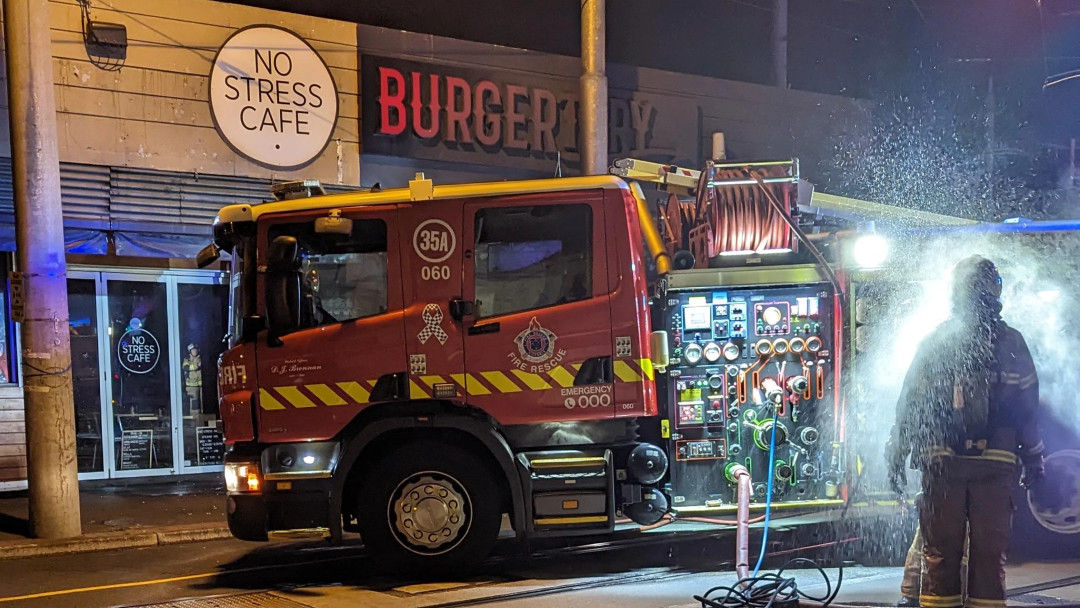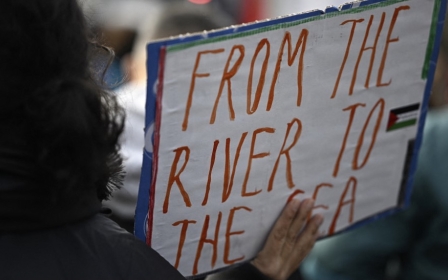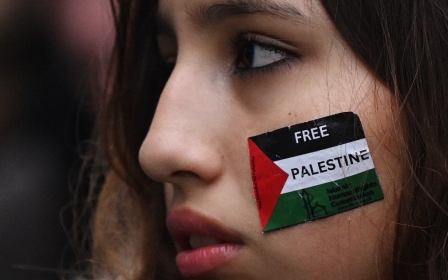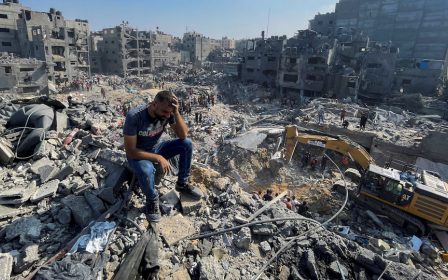Islamophobia is 'always again' and Palestine is its permanent fixture
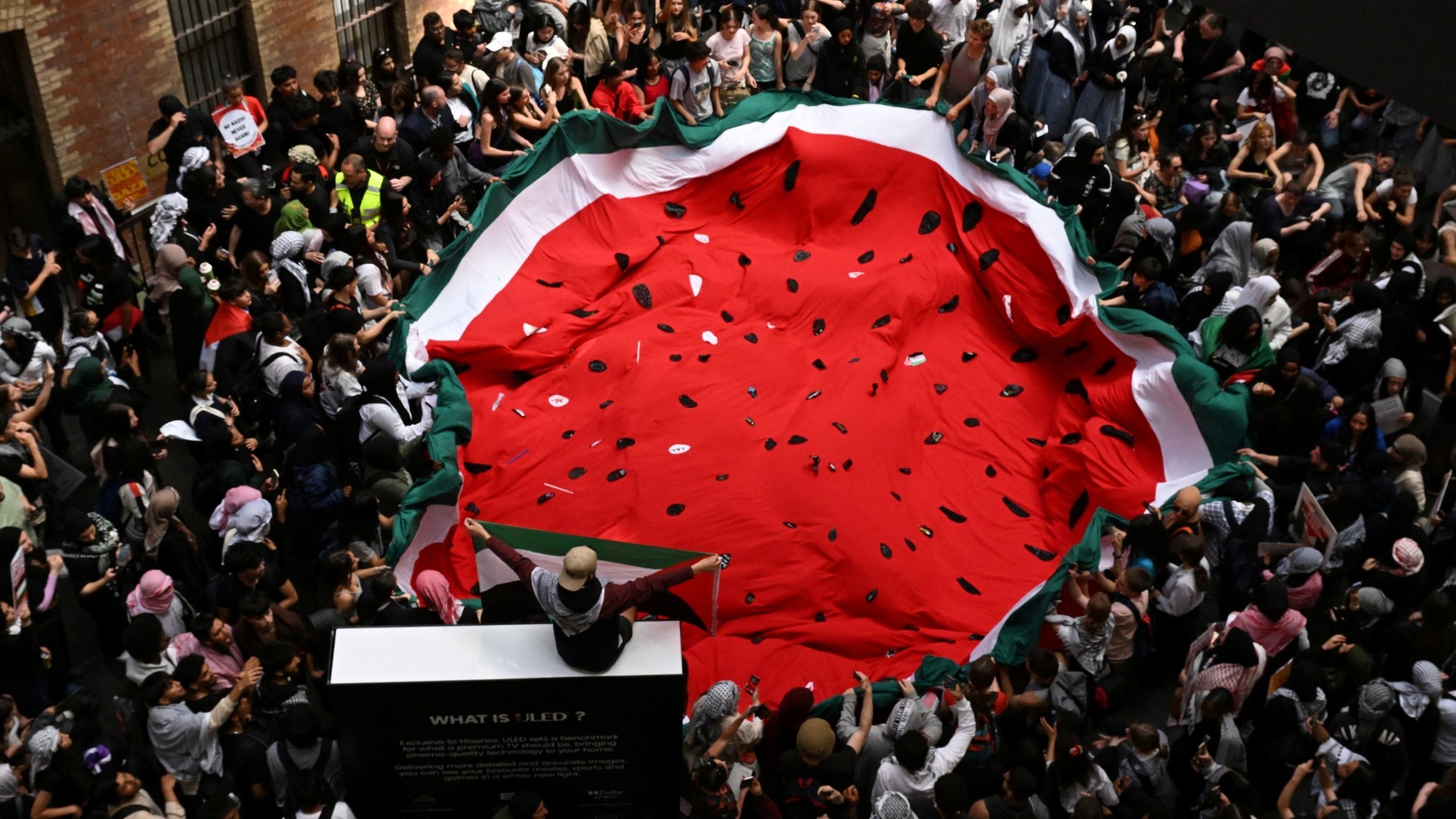
The post-10/7 political climate has shattered the hasty post-racial assessment of the state of Islamophobia in decline. It has exposed how Islamophobia is what makes possible the defence of genocidal violence in Palestine.
The surge in everyday Islamophobia at a time when the mass murder of Arabs and Muslims has never been more visible and wholesale indicates that something has gone amiss.
In Melbourne, Australia, the alarming firebombing of a local business in Caulfield, described as a "suspicious fire" by Victorian Police, coincided with the Palestinian owner facing intense criticism for participating in "Free Palestine" and "Ceasefire" rallies.
This incident underscores the urgent need to reassess the depth and intensity of anti-Muslim racism and its utilisation in various political agendas. For example, the Australian government's refusal to support a ceasefire during Gaza's bombardment and the national response to this crisis has cast a spotlight on the role of Islamophobia.
It is crucial to question and observe what enables authorities and media to not only overlook the severe violence against Palestinians but also to criminalise and further vilify those who protest and voice the atrocities inflicted on them. Such a scenario calls for a critical examination of Islamophobia's influence on both societal attitudes and policy responses.
New MEE newsletter: Jerusalem Dispatch
Sign up to get the latest insights and analysis on Israel-Palestine, alongside Turkey Unpacked and other MEE newsletters
In the wake of atrocities against Palestinians in Gaza and the firebombing of a pro-Palestine restaurant, Muslim academics and community organisers have come together to form Islamophobia Observer Australia (IOA). The scale of violence in Gaza and the policing, criminalising and censoring of Palestine advocacy networks - many of whom are Palestinian, Arab and Muslim - highlight the dangers of Islamophobia now more than ever.
The violent conditions faced by Palestinians with reverberating effects globally signal how Islamophobia quickly securitises the political terrain. The launch of IOA points to a greater urgency to both understanding and opposing the impact of ongoing Islamophobia against individuals and communities, and its relationship to global and domestic military and political interventions, campaigns, and endorsement.
The driving force
An analysis of Israel's response to the 7 October Hamas attack, which fails to scrutinise beyond the pervasive Islamophobic rhetoric critically, not only clouds our judgement but also inadvertently feeds into the cycle of "forever wars" driven by Islamophobia. This shortsightedness hinders the development of a comprehensive and unbiased understanding that is vital for unravelling the entrenched cycle of violence and prejudice.
This cycle was recently exemplified by the US withdrawal from Afghanistan in 2021. It symbolised the end of a particular chapter of the "forever war" but left behind a legacy of regional destabilisation, the loss of 4.5 million lives globally, and a resurgence of Anglo-European nativism due to escalating humanitarian crises and mass displacement.
Follow Middle East Eye's live coverage for the latest on the Israel-Palestine war
The present situation underscores our entry into a new phase of the "forever war", deeply intertwined with the persistent issue of anti-Muslim racism. Despite witnessing the deadly effects of Islamophobia such as the 2019 mosque attacks in Christchurch with the murder of 51 Muslims, there is still reluctance to see that Islamophobia plays a key role in rationalising the destruction of Palestine and the mass killing of Palestinians as Muslims.
Over the past eight weeks, we have witnessed an alarming pattern of silencing and excluding Palestinian Muslims, Christians, and Jews from national conversations on an issue that directly impacts them. Speaking to the National Press Club of Australia, Francesca Albanese, the UN rapporteur for the occupied Palestinian Territories, stated that what we are observing is “anti-Palestinian racism”, which is a “separate chapter of anti-Arabism”, and “once you see it, you can’t unsee it.”
To fathom the scale of the violence meted out against Palestinians, and its acceptance in the 21st century, is impossible without identifying Islamophobia in this colonial calculus
Anti-Palestinianism needs to be understood through the historical lens of the eliminationist logic of settler colonialism. Still, the scale of the violence meted out against Palestinians and its acceptance in the 21st century is impossible without identifying Islamophobia in this colonial calculus.
Anti-Palestinian sentiment is deeply rooted in an economy driven by Islamophobia, where Arabs, Palestinians, and Muslims are often lumped together as an indistinct mass, collectively stereotyped under the banner of Islam and subjected to broad-brush attributions of failure, violence, and supposed cultural defects.
Crucially, these stigmatising views are propagated by current global powers who assert their authority to dictate what belongs in our world and what does not. This makes Islamophobia not only exceptionally perilous but also a strategically advantageous tool for those who endorse the eliminationist ethos of settler colonialism.
In this context, Islamophobia serves as a key instrument in justifying and facilitating the systematic oppression and erasure of certain groups, reinforcing the dangerous and often unchallenged narratives that fuel such exclusionary ideologies.
Examining the Caulfield incident and its subsequent reception offers a critical lens through which to understand the evolving nature of Islamophobia, particularly as it manifests in contemporary forms of anti-Palestinian sentiment.
The Caulfield incident
Burgertory, a Palestinian-Australian-owned business in Caulfield, Melbourne, received multiple threats after its CEO, Hash Tayeh, posted a video to the business’s social media account of himself leading chants of freedom at one of Melbourne’s weekly "Free Palestine" rallies.
Community outlets and right-wing media reported on the post, portraying his chants as antisemitic and hateful. The business was firebombed on 10 November, an act the police quickly dismissed as neither a hate crime nor politically motivated. Earlier, Tayeh, alongside the Islamic Council of Victoria and several Palestine advocacy groups, issued a statement calling it a hate crime.
People with Israeli flags congregated and chanted outside the firebombed restaurant for most of that Friday, a sacred day of worship for Muslims. A video also circulated online within the Arab and Muslim community of a Caulfield resident rejoicing at the attack on the restaurant, saying: “...not sure if it’s the cooking or the smell of burnt children in Gaza.”
When Arab community members arrived later to inspect the site of the burnt-down Palestinian restaurant, clashes ensued, well before the protest which began at 7pm local time. Those individuals were rounded up as agitators whose presence posed a threat to the Jewish community.
Later, the planned gathering of the anti-racism solidarity protest moved further away from the crime scene to the nearest park in an effort to avoid further confrontations, only to be faced by a hostile pro-Israel group that became increasingly aggressive, at first near the park and later across a police line on the other side of the road.
The arson attack on a Palestinian restaurant, along with the counterprotest against the solidarity demonstration, the police's reaction, and the media's skewed portrayal - relegating the firebombing to a mere footnote in their coverage of subsequent clashes - sharply exposes Islamophobia's insidious nature.
These interconnected events offer a telling insight into how Islamophobia manifests both as physical violence and in symbolic forms. The way these incidents unfolded and were reported highlights a systematic trend, revealing an underlying dependence on Islamophobia that either perpetuates, legitimises, or overlooks such acts of aggression and bias.
Dehumanising protesters
The immediate response from news outlets, politicians, and media commentators was to frame the diverse anti-racism solidarity protesters as intimidating, violent outsiders. The demonisation campaign included misleading reports, if not direct accusations, that the target was actually a nearby synagogue.
Such portrayals align with the Islamophobic trope of characterising Palestinians, Arabs, and Muslims as inherently antisemitic and violent, and rely on the stereotype that Arab and Muslim political will is inherently threatening to Jews.
In the hours and days following the incident, media coverage shifted focus. It obfuscated the story by a) diverting attention away from the firebombing of a Palestinian-owned business, which had publicly opposed the genocide in Gaza, and b) misrepresenting the Free Palestine Movement and their anti-war, pro-liberation stance as an inherently antisemitic movement posing a security threat to peace and Jewish citizens.
This shift effectively sidelined - and at times completely overlooked - the core issue of the firebombing.
As a collective sensitive to how dehumanising language functions, IOA hesitates to repeat the verbal attacks directed at those visiting the arson site, yet it is for that same reason that they bear mentioning. Vile insults like “You’re ISIS terrorist scum”, “You’re ISIS filth”, and “ISIS filth, women-raping filth”, hurled by individuals bearing Israeli flags outside the firebombed restaurant, highlight prevailing Islamophobia.
This rhetoric further reveals the way the invasion of Gaza and the Palestinian cause is framed exclusively in terms of terrorism, erasing the well-documented history of the Nakba and legitimate grievances of the Palestinian people.
The alarming trend in the media of "terrorist framing", focuses disproportionately on alleged Arab aggression, overshadowing their perspectives, and producing a structural bias that effectively turns even the freest media into a mouthpiece for justifying state aggression against Arab populations and silencing critical domestic voices.
This results in a structural bias that effectively transforms even the most balanced media into a mouthpiece for justifying state aggression against Arab populations and silencing critical domestic voices. Australian media, like the ABC, have made decisions not to use words like ‘genocide’ and ‘apartheid’ in coverage of Gaza. Not only does this give further credence to the terrorist paradigm, but it decontextualises the conflict, leaving the Australian public with little awareness of what is happening on the ground.
These harmful attitudes were further reflected in recent police action against Arab solidarity protestors.
The use of dehumanising language, such as calling the protesters “dogs”, “worse than animals”, or “sub-human”, and telling them to “go back to Gaza”, is a clear manifestation of racism. It makes clear that Palestinians and their supporters do not belong and seeks to delegitimise their presence in an area with a large Jewish community. This rhetoric further marginalises and dehumanises Palestinians, Arabs, and Muslims, stripping them of their right to protest and express dissent.
The long history of Islamophobia and Orientalism accounts for how Arab and Muslim dissent is always presented as an expression of rage that cannot be examined, only condemned and violently opposed.
In the context of Palestine and Israel, the focus on Jewish security and victimhood is often presented as a dichotomy, a trade-off to the equally critical need for security and empathy for Palestinians. This is particularly apparent in the evacuation of the synagogue and the police's disproportionate response to antiracist protesters, revealing a tendency to de-centre and devalue Palestinian lives and safety, even after the firebombing of a prominent Palestinian figure’s business.
We see this also in Victoria Premier Jacinta Allan’s comments: “It is unacceptable that local communities here feel it is unsafe to go to their places of worship, to feel unsafe in their local neighbourhoods.” Leaving out the firebombing of the restaurant, she continues: “It’s unacceptable that last night this was the experience of Melbourne’s Jewish community.”
Palestinians, often labelled as Arabs and Muslims, are persistently depicted as aggressors rather than victims in discussions about Palestine, regardless of the severity of their suffering. This portrayal, as seen in the Australian national discourse on the incident, aims to diminish the gravity of Palestinian hardships and the validity of their cause.
This approach is a typical strategy in Islamophobic narratives prevalent in the "forever wars", where the focus is strategically shifted in order to target Muslim populations as a whole.
Denial of Palestinian suffering
The pro-Israel supporters' comments and authorities' responses reveal a widespread reluctance to acknowledge Palestinian suffering, a reflection of deep-seated Islamophobia. This is starkly evident in the Caulfield incident, where media emphasis on subsequent events overshadowed the initial violent act. This tendency to minimise Palestinian suffering and silence their narratives, while emphasising other conflict aspects, exemplifies a broader trend that obscures their struggle and perpetuates Islamophobic biases and policies.
This phenomenon is deeply rooted in Eurocentric folklore and a colonial narrative crafted to assert domination over and facilitate the erasure of Muslims and Arabs
We have seen how decisions are made by states to garner public and institutional support for campaigns of military warfare in Afghanistan, Iraq, and beyond as part of its war on terror. This forever war criminalised and treated the impacted communities as hostile and suspicious, through policies of torture, incarceration, rendition, detention, raids, policing, revoking of citizenship, and immigration bans.
Securitisation has shaped the political landscape, and, with it, the normalisation of speaking about Muslims and Arabs in its terms. None of these decisions would be possible without the state and media outlets appealing to the public by mobilising Islamophobia. At this critical historical juncture, the resurgence of Islamophobia coincides with heightened public focus on Palestine, particularly in response to the appalling violence against the Palestinian people.
This familiar recourse to Islamophobia underscores its persistent effectiveness in masking and obfuscating the truth and silencing dissent. It aims to coerce public institutions and individuals into complicity, allowing violent state actions to proceed unchallenged.
Furthermore, this phenomenon is deeply rooted in Eurocentric folklore and a colonial narrative crafted to assert domination over and facilitate the erasure of Muslims and Arabs. Such narratives serve the interests of settler and colonial wars, reinforcing the oppressive structures and ideologies that underpin them.
The conflation of terrorism and the "green scare" of Islamisation projected onto the Palestinian resistance signals how Palestine is the testing ground for Islamophobia. As sociologist Salman Sayyid observed, Islamophobia is the "Palestinianisation" of any expression of Muslim agency.
While the war on terror has made possible a more entrenched occupation and securitised rationale for violence in Palestine, it has global effects in pushing violence towards a precipice from which we cannot return. The securitisation of Palestinian agency has rendered the Palestinian will to be free as a will to destroy Jews. The Palestinisation of Muslim agency here in the West is perceived as a will to replace whites and commit "white genocide".
IOA was founded to warn against the normalisation of violence that may provoke further Islamophobic acts. Islamophobia in this context is far from a mere expression of "pedestrian biases"; it is a potent, battle-tested weapon of hatred that renders large-scale violence against Palestinians, and Muslim bodies more broadly, conceivable and executable.
This includes everything from enduring conflicts reminiscent of a "forever war" to riots targeting Arabs and Muslims, and even individual acts of terror, as tragically exemplified by the Christchurch massacre.
The authors are members of Islamophobia Observer Australia, an advocacy organisation founded in the wake of Israel's genocidal war on Gaza and the resurgence of Islamophobia in Australia.
The views expressed in this article belong to the authors and do not necessarily reflect the editorial policy of Middle East Eye.
Middle East Eye delivers independent and unrivalled coverage and analysis of the Middle East, North Africa and beyond. To learn more about republishing this content and the associated fees, please fill out this form. More about MEE can be found here.


